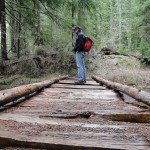
It’s been a busy month for me work-wise, for which I am grateful. Holiday advertising is in full swing, which means voiceovers — for which I am also grateful. And I just finished narrating one book and am starting into another* — again, grateful!
But I was sure looking forward to a day off at Thanksgiving. We’d be convening at my sister’s house in the foothills of the Oregon Coast Range. It would be a complete change of scenery and pace, and I promised myself that I would not talk, not even THINK, about work for the whole darned day.
And that’s what happened. For awhile. A wonderful dinner, the pleasure of beloved family around me, the smell of the woodstove, the sound of rain misting down outside. A special treat this year was one of the guests, Wagner Soares, a professional bassist and music student from Brazil. He was part of a recent CD project for which my sister wrote some lyrics, and he is a gem of a human being: sensitive, talented, intelligent.
Before pie, we all suited up in rain gear and headed out on our traditional Thanksgiving Day hike. A mile or so into the forest, most of the group turned around, but I wasn’t done hiking — I’d been waiting for this for weeks! — so Wagner and I continued on alone. We chatted a little about general things, then about our respective work, and then Wagner asked: ”So what mics do you have?”
And it was all over.
We talked and talked: about mics and mixers, about Pro Tools and Logic and Apogee and frequency response and the pencil tool and getting your groove back when you have to stop for punch-ins. We discovered that we both have a tendency to enjoy the solitude of our work too much, so we’re both strict about getting out for daily walks. I told Wagner I’d once had to struggle through some Portuguese names in an audiobook, and he taught me basic pronunciation. Wagner tried to describe how he misses and doesn’t miss Brazil, and I taught him the English proverb “Absence makes the heart grow fonder.”
Suddenly we looked around: it was almost dusk, and we were at the intersection of two logging roads I’d never seen before, with miles of forest around us.
“Should we take the right-hand fork?” Wagner asked. ”It looks like it might eventually loop back to the road.”
This, of course, would have been extremely unwise. You don’t want to follow an unknown route in the coast mountains, out of cell phone range, at dusk, in the rain. It wouldn’t have been a dire situation, but it could have gotten miserable pretty fast. We were also dressed in deer colors, and I didn’t have my trusty cougar alarm.
And yet, I considered it. I mean, we were just starting on the topic of Blue mics for the iPad!
But I dragged my attention back to our surroundings and told Wagner we needed to retrace our route. After all, I said, we’d still have the several miles back to tie up all our conversational threads. By the time we made it back to the house, we were wet, hungry, blessedly talked-out, and thoroughly enjoying our new friendship.
So yes, I did talk about work on my day off. A whole lot.
And for that, I am grateful.
